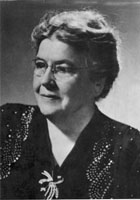Grace Noll Crowell
Grace Noll Crowell Poems
Let me come in where you are weeping, friend,
And let me take your hand.
I, who have known a sorrow such as yours,
...
I have found such joy in simple things;
A plain clean room, a nut-brown loaf of bread,
A cup of milk, a kettle as it sings,
The shelter of a roof above my head,
...
Whatever else be lost among the years,
Let us keep Christmas still a shining thing:
Whatever doubts assail us, or what fears,
...
I never came to you, my friend,
and went away without
some new enrichment of the heart;
More faith and less of doubt,
...
The common tasks are beautiful if we
Have eyes to see their shining ministry.
The ploughman with his share deep in the loam;
The carpenter whose skilled hands build a home;
...
This, too, will pass.
O heart, say it over and over,
Out of your deepest sorrow,
out of your deepest grief,
...
Little, lovely, friendly town
Bright beneath your maple trees -
With your dooryards sending out
Lilac scent upon the breeze;
...
Grace Noll Crowell Biography
Grace Noll Crowell (October 31, 1877 - March 31, 1969) was an American poet, author of 36 books of inspirational verse and 5,000 poems. Her work has appeared in hundreds of magazines and newspapers. Crowell was born in Inland Township in Cedar County, Iowa, to Adam and Sarah Noll. She was educated at the German-English college in Wilton, Iowa. Crowell first attempted writing poetry at the age of 8, but in a rare instance of non-support by her otherwise loving family, found her efforts laughed at as an infantile effort. She stated, "I never tried to write after that until love and romance and a home came to me. That quickened and awakened the desire to write poetry again." After earning her Bachelor of Arts in 1901, that love came to her when she married Norman H. Crowell, also a writer. They had three sons; Norman Crowell died in 1953. With her husband, she moved to Farmington, Minnesota, where he worked as a bank teller and she as a housewife and mother. However, in 1906 she fell gravely ill, and despite receiving the best medical care available at the time, she failed to improve. While resigned to spending life as an invalid, she had no desire to be a burden to her family, and determined to become a writer; her first poem, "The Marshland," was written and published while she was recovering from her illness. It was primarily her long confinement and suffering in various hospitals that led her to write verses of hope, patience, and inspiration; she stated, "The thought kept coming to me, 'I would like to write poetry that will help others who are suffering as I am.'" She continued to write, and many of her works were subsequently published in popular periodicals. Crowell's health improved following a move to Sioux City, Iowa; the family subsequently migrated to Wichita Falls, Texas, in 1917 and two years later to Dallas, Texas where she spent the rest of her life. Her first book of poetry "White Fire," which was published in 1925, received first prize from the Texas Poetry Society. In 1936 she was appointed Poet Laureate of Texas, a position she held for three years. She was awarded the Golden Scroll Medal of Honor as National Honor Poet in 1938. That same year she was designated American Mother of the Year by the Golden Rule Foundation, and American Woman, a biographical publication, selected her as one of the ten Outstanding American Women. Baylor University awarded her an honorary doctorate degree in 1940. She was so popular it was necessary for her husband to quit his job to manage her writing career. Thousands of pieces of correspondence from grateful readers needed to be answered and hundreds of visitors from all parts of the United States and Europe who visited her at her Dallas home needed to be received. Crowell wrote books of poetry, stories for children, and poem and prose devotions. Lee Mero illustrated several of her children’s books. Her "Songs for Courage" went into twenty-five printings. She continued writing until she was 86 years old. "God's Masterpieces," a devotional book was her last published work before her death. Crowell died on March 31, 1969, at age 91, and is buried at Hillcrest Memorial Park Cemetery, in Dallas, Texas. "Let the Sun Shine In" was published posthumously in 1970. In 1977 a reprint of her 1965 collection of poems appeared as "The Eternal Things: The Best of Grace Noll Crowell." Although time has relegated her to the status of a minor poet, she was selected by the America Publishers as one of the ten outstanding American Women of 1938, and in the early 1940s she was called "the most popular writer of verse in America." Her poem, "Because of Thy Great Bounty" is included in the 1985 Hymnbook of The Church of Jesus Christ of Latter-day Saints, under the title of "Because I Have Been Given Much", set to music by Philip Landgrave. This hymn was originally set as a choral piece by Landgrave and was later included in the 1975 and 1991 Baptist Hymnals. Landgrave named the tune SEMINARY, in homage to the Southern Baptist Theological Seminary in Louisville, Kentucky, where he was a professor for many years.)
The Best Poem Of Grace Noll Crowell
To One In Sorrow
Let me come in where you are weeping, friend,
And let me take your hand.
I, who have known a sorrow such as yours,
Can understand.
Let me come in - I would be very still
Beside you in your grief;
I would not bid you cease your weeping, friend,
Tears can bring relief.
Let me come in - I would only breathe a prayer,
And hold your hand,
For I have known a sorrow such as yours,
And understand.

Looking for her poem called Poplars